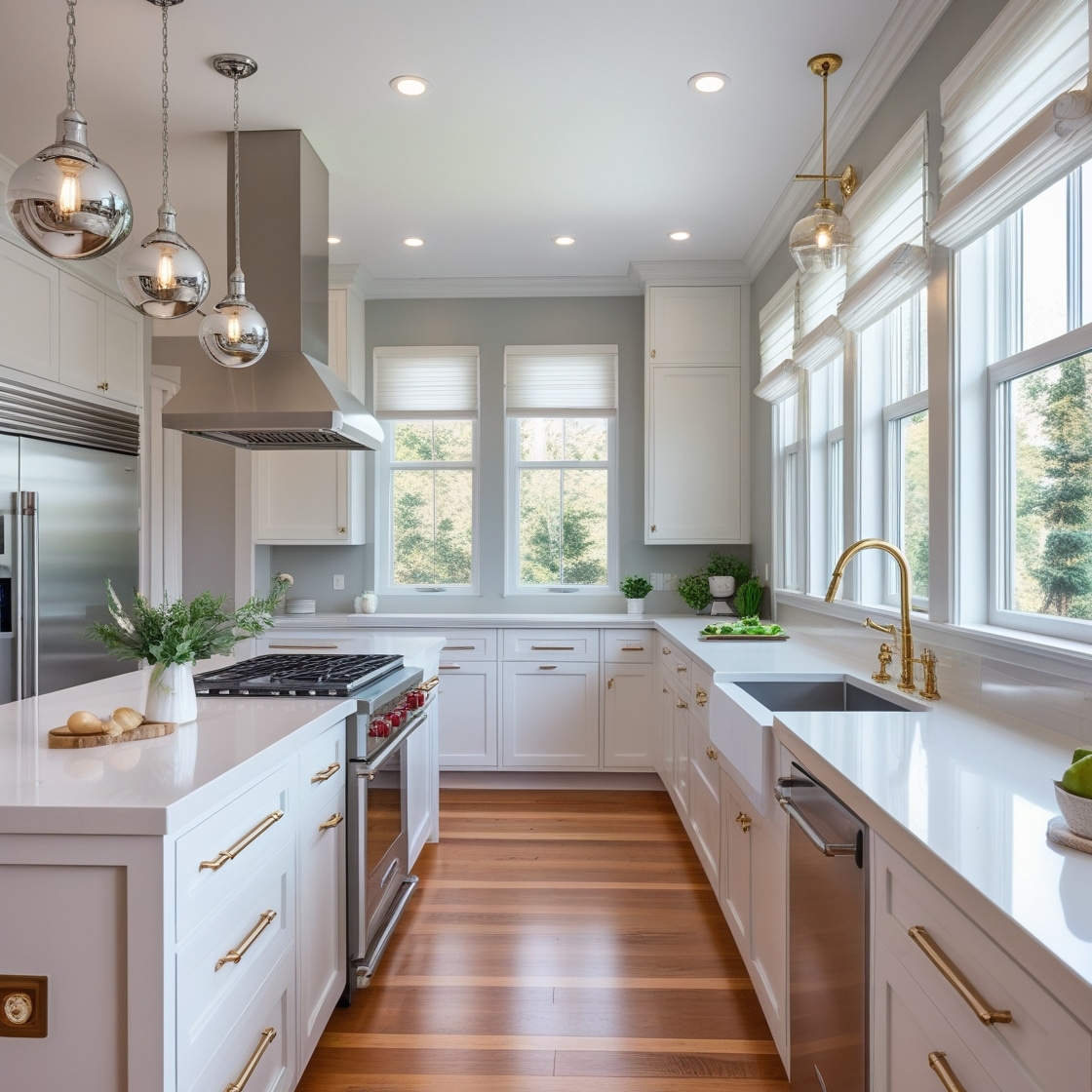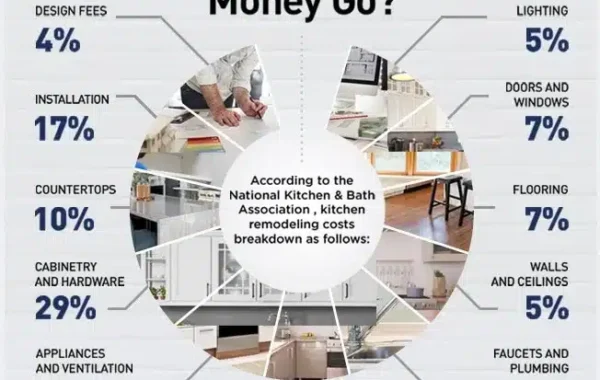
Expert Tips for Successfully Renovating Your Chicago Apartment
Renovating an apartment in Chicago can be an exciting journey, allowing you to transform your space into a stylish and functional oasis. Whether you’re updating a single room or embarking on a full-scale remodel, careful planning, attention to detail, and understanding the unique challenges of Chicago’s building codes and climate are essential. In this post, we’ll provide you with expert tips and insights to ensure your renovation project is successful from start to finish.
Understanding Chicago’s Apartment Types
Two-Flat and Three-Flat Apartments
Chicago is famous for its multi-flat apartments, often built as two-flats or three-flats. These buildings contain separate living units on each floor, making them a great option for homeowners looking to live in one unit and rent out the others for supplementary income.
However, renovating these multi-unit structures presents its own set of challenges. Plumbing and electrical systems are often shared with neighboring units, so you’ll need to take extra care when planning your renovations. For example, contact the Department of Buildings Water Plan Desk before starting any non-emergency plumbing work. Additionally, if your apartment shares the main electrical service with a neighbor, an inspection by the Electrical Bureau of Chicago is necessary before removing any wiring.
Condos
Condos are a popular choice for first-time homebuyers in Chicago, as they tend to be more affordable than single-family homes. Many condos are located in prime neighborhoods, making them great investments.
Renovating a condo requires a bit more planning due to homeowner association (HOA) rules. For instance, most condo associations have a standardized process for repairs and remodeling that may be limited to the interior or rear of the unit. It’s important to consult your HOA before starting any work. You might also need to be mindful of landscaping changes that could affect drainage and impact your neighbors.
If you’re renovating for resale, small updates such as converting a bathtub into a walk-in shower can increase your condo’s value. For example, one of Sweeten’s clients in Bucktown increased the resale value of her condo by updating two bathrooms, with a full remodel of the primary bathroom.
Industrial Lofts
Chicago is known for its industrial lofts, which have been converted from old warehouses and factories. These spaces are full of character but may require more specialized planning. For example, zoning laws could become a challenge if you’re changing the building’s use or making significant structural changes.
If you own an industrial loft in a converted space, be sure to familiarize yourself with the local zoning regulations before starting your remodel. A visit to the City of Chicago Zoning Map can help clarify the zoning for your lot.
Common Remodeling Hurdles in Chicago
Building Age
Chicago’s historic buildings are one of the city’s most cherished features. However, many of these older structures may not meet current building codes, especially when it comes to plumbing, electrical systems, and HVAC. During demolition, it’s common for contractors to discover outdated or inadequate systems behind the walls.
When renovating, consider having your systems inspected and upgrading them as needed to meet modern standards. This may not only ensure the safety and efficiency of your home but also prevent future issues.
Weather Impact
Chicago’s weather can significantly impact your renovation timeline. In winter, heavy snowfall and freezing temperatures can make it difficult for contractors to access your apartment and transport materials. Additionally, materials like paint and concrete may take longer to dry and cure in cold conditions.
During summer, high humidity and thunderstorms can cause delays, and heat may impact curing times as well. Always discuss potential weather-related delays with your contractor to set realistic expectations.
Permitting Process
Before beginning any significant remodeling work, make sure you understand the permitting process. Depending on your project’s scope, you may need permits from various city departments. For example, if you’re working with plumbing or electrical systems, you’ll need approval from the Department of Buildings. If you’re renovating a historic building, additional permits from the city’s Landmark Preservation Department may be required.
Make sure to check the specific permit requirements based on your apartment’s structure and the changes you plan to make. Starting the permitting process early will save you time and prevent any last-minute issues.
Accessibility and Construction Challenges
If your apartment is located in a high-rise or difficult-to-access building, expect to face additional challenges. Large items, such as appliances or materials like seamless countertops, may need to be hoisted through windows, which can add to both the complexity and cost of your renovation.
Be sure to discuss any accessibility issues with your contractor upfront so they can plan accordingly and avoid unnecessary delays.
Planning Your Renovation
Setting Realistic Goals
One of the most important aspects of any renovation is setting clear, realistic goals. Start by assessing what needs updating or replacing. Are you focusing on a specific room, such as the kitchen or bathroom? Or are you planning a complete overhaul?
When setting goals, prioritize both aesthetics and functionality. It’s important to strike a balance between making your apartment more stylish and ensuring it’s practical for your everyday life.
Hiring the Right Professionals
Hiring the right professionals is crucial for a successful renovation. In many cases, a general contractor is your best bet, as they can manage the entire project and handle multiple aspects of the renovation, such as electrical work and plumbing.
If your project involves major structural changes, you may need an architect or designer to create detailed plans and drawings. For smaller remodels, such as updating a kitchen or bathroom, hiring a skilled general contractor should suffice.
Using a service like Sweeten can connect you with top-rated contractors in your area who are familiar with local codes and regulations.
Permit Application Process
Once you’ve hired your contractor, they will likely handle the permit application process for you. However, as a homeowner, you’ll need to provide documents such as your deed and plat map. Make sure to have these ready to streamline the process.
If your renovation requires a regular building permit, be prepared to submit detailed plans, especially if you’re adding square footage or making significant changes to plumbing, electrical, or mechanical systems.
Cost Factors and Budgeting
Key Cost Drivers
The cost of a renovation can vary significantly depending on several factors. The scope of the project, the size of your apartment, and the finishes you select will all affect the total cost. Larger renovations often require extensive demolition, which can quickly add up.
The type of materials you choose, whether they are budget-friendly or high-end, will also impact your budget. For example, opting for more affordable materials like laminate countertops instead of natural stone will help you save money without sacrificing quality.
To keep costs down, consider utilizing existing plumbing when possible. Major changes to plumbing or electrical systems will require more time and expertise, which could significantly increase your costs.
Understanding Fees and Estimates
When working with contractors, make sure to get a few estimates for comparison. This will help you understand the range of costs and avoid any surprises down the road. If you’re unsure about your budget, tools like Sweeten’s cost guides can help you plan accordingly and make sure you’re getting the best value.
Safety and Compliance During the Renovation
Ensuring Workplace Safety
Safety should always be a top priority during your renovation. A reliable contractor will ensure that all work is performed according to safety standards and that any necessary inspections are completed.
Additionally, complying with local building codes is crucial for the safety of both workers and residents. Make sure your contractor is fully licensed and insured to guarantee that your project meets the city’s strict requirements.
Smart Home Technology Integration
Incorporating smart home technology into your renovation can increase both the functionality and value of your apartment. Consider adding smart thermostats, lighting, and home security systems to enhance your living experience. These upgrades can make your apartment more energy-efficient and more convenient to live in.
Finalizing Your Renovation
Post-Renovation Inspections
After completing your renovation, a final inspection is essential to ensure that everything is up to code. This is particularly important if you’ve made significant changes to the apartment’s infrastructure or systems.
Your contractor should schedule this inspection as part of the final stages of your project.
Enjoying Your Newly Renovated Apartment
Once your renovation is complete, take time to enjoy the fruits of your labor. Whether you’ve updated a bathroom, modernized your kitchen, or completely transformed your apartment, make sure to arrange your space in a way that fits your lifestyle.
Conclusion
Renovating your Chicago apartment can be an exciting and rewarding process if you approach it with the right mindset and preparation. By understanding the unique challenges of your building type, hiring experienced professionals, and staying on top of the permitting and budgeting process, you can ensure a successful renovation.
If you’re ready to get started, Sweeten can help you find trusted contractors and offer expert guidance every step of the way.
Q: Do I need a permit to renovate my apartment in Chicago?
A: Yes, most renovations require a permit from the Department of Buildings. For simpler projects, the Easy Permit Program may apply.
Q: How can I stay within my budget for a Chicago apartment renovation?
A: Plan your scope carefully, select cost-effective materials, and consider using existing plumbing and electrical. Sweeten can help match you with contractors that offer transparent pricing.
Q: How do I find the right contractor for my renovation?
A: Look for experienced contractors familiar with Chicago’s codes and apartment remodels. Sweeten can help connect you with trusted professionals in your area.
Q: What should I know about renovating a condo in Chicago?
A: Condo renovations often require HOA approval, and work is typically limited to interior spaces. Check with your HOA before starting any projects.
Q: How does the weather impact my renovation timeline?
A: Chicago’s weather can delay material deliveries and work access, especially in winter. Discuss potential weather-related delays with your contractor to manage expectations.

